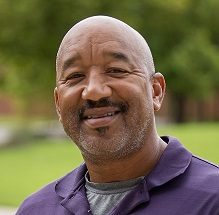
Dr. Rufus Barfield presents his research on communication processes among multidisciplinary bone marrow transplant teams at the 2025 International Conference on Communication in Healthcare (ICCH).
By: Majdulina Hamed | Published October 8, 2025
If you have any news, accomplishments or highlights about your work or life, please be sure to share them with us, by emailing us at NicholsonNews@ucf.edu.
Rufus L. Barfield, Ph.D., Associate Professor of Human Communication at the Nicholson School of Communication and Media (NSCM), has been selected to present his research at the 2025 ICCH this week in Ottawa, Ontario. This global gathering brings together healthcare leaders, researchers, educators, and practitioners dedicated to advancing patient care and health equity through communication.
“This opportunity means that I have the chance to share my research with other healthcare communication researchers and practitioners in the field on a broad international stage,” Barfield says. “It also showcases the research and scholarly contribution of NSCM in research and application of healthcare communication.”
Dr. Barfield’s study, An Empirical Analysis of Communication Processes Among Multidisciplinary Bone Marrow Transplant Teams in Cancer Center Team Meetings, examines the complex dynamics within medical teams and highlights how communication directly impacts patient outcomes.
“Understanding the complexity and nuances of communication processes and group dynamics amongst multidisciplinary medical teams was my motivation for pursuing this research,” he says.
Among his findings, Dr. Barfield emphasizes the importance of recognizing the role of non-clinical information in patient care, such as the influence of family relationships on both psychological and biomedical outcomes. He also highlights the benefits of shared decision-making, encouraging collaboration between patients and clinicians, and the value of strong team facilitation skills that balance both task and socio-emotional roles.
“Medical expertise was never in question,” Barfield says. “However, understanding and appreciating the role of communication and non-clinical contributions provided an opportunity for better understanding and application.”
He believes that representing NSCM at ICCH will elevate UCF’s visibility in the global healthcare communication community.
“I am honored and grateful to be representing NSCM at ICCH,” he says. “I am confident that my participation and contribution will be appreciated and make a valuable contribution to the study of healthcare communication.”
In addition to sharing his work, Barfield views this conference as a platform for fostering collaboration and inspiring future innovation. He also encourages students and early-career researchers to embrace interdisciplinary learning.
“Establish and cultivate a network of varied healthcare researchers, practitioners, and scholars,” he says. “Pursue academic courses in group dynamics, small group psychology, business, and mindfulness.”
Dr. Barfield also expressed a long-term vision he’s striving for: the creation of a multidisciplinary center for the study of healthcare communication at UCF.
“I believe a center like this would distinguish UCF NSCM nationally and internationally,” Barfield said. “It would be a hub for advancing healthcare communication research, education, and practice.”